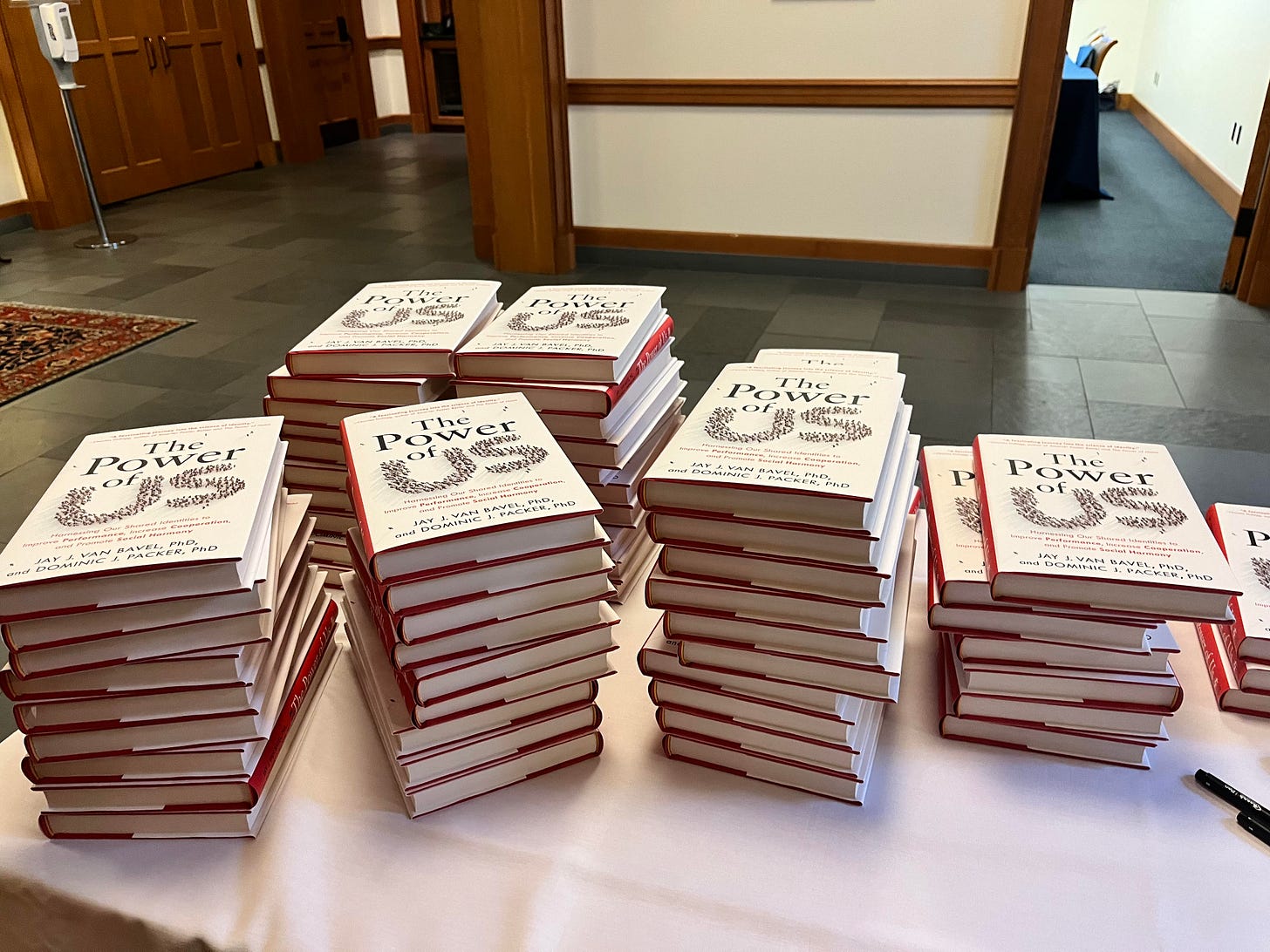The POWER OF US Course: A syllabus for teaching about social identity
Issue 123: Calling all educators: we have new free educational materials for teaching about the Power of Shared Identity
With the new school year on the horizon, we decided to share a syllabus for anyone interested in teaching about “The Power of Shared Identity” based on our book. This is a chance for people to learn directly from our book, but also go beyond it and dig into the underlying research, fresh studies, and educational materials we created. We suggest readings from some of the most relevant articles for each chapter and added new research published since we wrote the book.
Our free educational content package includes:
Syllabus and course schedule
Educational videos
Suggested readings
Chapter summaries & key takeaways
Lecture slides (editable .pptx file)
Test questions
Interactive activities/assignments
Interactive class Q&A with either Jay or Dom
We will also offer a free paid subscription to the Power of Us newsletter for any educator who assigns our book in their class.
The course syllabus is ideal for college students, but can easily be adapted for book clubs (e.g., by focusing on on the book and excluding any assignments), organizations (e.g., by making the original research articles optional and including case studies or practical activities), or academic seminars (e.g., by focusing on the original research articles and requiring an original research project). We encourage people to be creative and adapt the content for their audience.
We also visit the classes of educators who use our teaching materials! Last year, we visited several classes at various universities around the world. We also did an interactive Q&A with Dr. Helen Harton’s course Influence: Harnessing Psychology to Create a Better World. We created a newsletter with our Q&A with students from her class.
Visit this link to request our teaching materials and keep scrolling down for the .word and .pdf links to the syllabus!
Course Title: The Power of Shared Identity
Course Description: This course provides an overview of the psychology of shared social identities and their surprising influence on human thoughts, feelings, and behaviors. Students will learn frameworks for understanding identity and group dynamics from the book The Power of Us. Videos and case studies can be used to analyze effective and problematic uses of identity in achieving cooperation, performance, and social change. Students will apply course principles through projects focused on harnessing the power of shared identities.
Required Text: “The power of us: harnessing our shared identities to improve performance, increase cooperation, and promote social harmony” by Jay Van Bavel & Dominic Packer (2021). This can be purchased from our publisher or as an audio or kindle book from Amazon. Translations are also available in the UK, Brazil, Japan, China, Romania, South Korea, Mongolia, and United Arab Emirates.
Course Objectives:
By the end of this course, students will be able to:
Explain theories on social identity, social categorization, and intergroup relations
Analyze how shared identities shape perceptions, beliefs, values, and behaviors
Assess the role of identity in contemporary issues like polarization, inequality, and climate change
Evaluate effective and problematic uses of identity in cases studies
Design interventions to leverage shared identity for cooperation, performance, and overcoming bias
Course Schedule: The course is broken into 10 weeks of content (each week focuses on a different chapter from the book). However, the length can be adapted to add exams (e.g., adding two midterms and a final exam turns this into 13 week course) or assignments (e.g., we recommend adding a day at the end for class presentations).
Week 1: The Power of Us
Key topics: What is social identity and why is it powerful? Human needs for belonging, distinctiveness, and status.
Video: The sibling rivalry that divided a town (TED-Ed Video which includes exam items & further reading)
Activity: The WHO AM I? Challenge is a virtual tool we created to facilitate the 20 statements test we outline in our book. Students can visit the link here to do the class activity, and share their responses with us if they wish.
Suggested readings
Tajfel, H. (1970). Experiments in intergroup discrimination. Scientific American, 223(5), 96-103.
Yang, X., & Dunham, Y. (2019). Minimal but meaningful: Probing the limits of randomly assigned social identities. Journal of Experimental Child Psychology, 185, 19-34.
De Cremer, D., & Van Vugt, M. (1999). Social identification effects in social dilemmas: A transformation of motives. European Journal of Social Psychology, 29(7), 871-893.
Cohn, A., Fehr, E., & Maréchal, M. A. (2014). Business culture and dishonesty in the banking industry. Nature, 516(7529), 86-89.
Week 2: The Lens of Social Identity
Key topics: Identities shape perceptions, tastes, and attention. Identities can also misdirect and bias.
Suggested readings
Xiao, Y. J., Coppin, G., & Van Bavel, J. J. (2016). Perceiving the world through group-colored glasses: A perceptual model of intergroup relations. Psychological Inquiry, 27(4), 255-274.
Pandey, K., Stevenson, C., Shankar, S., Hopkins, N. P., & Reicher, S. D. (2014). Cold comfort at the Magh Mela: Social identity processes and physical hardship. British Journal of Social Psychology, 53(4), 675-690.
Kahan, D. M., Hoffman, D. A., Braman, D., Evans, D., & Rachlinski, J. J. (2012). " They Saw a Protest": Cognitive Illiberalism and the Speech-Conduct Distinction. Stanford Law Review, 851-906.
Williams, T., et al., (April 1, 2016). Police body cameras: What do you see? New York Times. https://www.nytimes.com/interactive/2016/04/01/us/police-bodycam-video.html
Week 3: Sharing Reality
Key topics: Groups influence beliefs through norms and social dynamics. Avoiding groupthink and gravitating toward truth.
Video: Why do people cling to false beliefs? (Youtube)
Suggested readings
Augenblick, N., Cunha, J. M., Dal Bó, E., & Rao, J. M. (2016). The economics of faith: Using an apocalyptic prophecy to elicit religious beliefs in the field. Journal of Public Economics, 141, 38-49.
Tourish, D., & Vatcha, N. (2005). Charismatic leadership and corporate cultism at Enron: The elimination of dissent, the promotion of conformity and organizational collapse. Leadership, 1(4), 455-480.
Robertson, C. E., Pretus, C., Rathje, S., Harris, E., & Van Bavel, J. J. (2022). How social identity shapes conspiratorial belief. Current Opinion in Psychology, 101423.
Pennycook, G., & Rand, D. G. (2022). Accuracy prompts are a replicable and generalizable approach for reducing the spread of misinformation. Nature communications, 13(1), 1-12.
Week 4: Escaping Echo Chambers
Key topics: Rising polarization and the role of identities. Solutions for bridging identity-based divides.
Video: Do politics make us irrational? (TED-Ed Video + exam items + further reading)
Podcast: The Roots of Polarization & Solutions to Polarization
Suggested readings
Finkel, E. J., Bail, C. A., Cikara, M., Ditto, P. H., Iyengar, S., Klar, S., ... & Druckman, J. N. (2020). Political sectarianism in America. Science, 370(6516), 533-536.
Crockett, M. J. (2017). Moral outrage in the digital age. Nature Human Behaviour, 1(11), 769-771.
Bail, C. A., Argyle, L. P., Brown, T. W., Bumpus, J. P., Chen, H., Hunzaker, M. F., ... & Volfovsky, A. (2018). Exposure to opposing views on social media can increase political polarization. Proceedings of the National Academy of Sciences, 115(37), 9216-9221.
Zhuravskaya, E., Petrova, M., & Enikolopov, R. (2020). Political effects of the internet and social media. Annual Review of Economics, 12, 415-438.
Week 5: The Value of Identity
Key topics: What drives identification? Why people identify with underdogs and value identity symbols.
Suggested readings
Akerlof, G. A., & Kranton, R. E. (2000). Economics and identity. The Quarterly Journal of Economics, 115(3), 715-753.
Cialdini, R. B., Borden, R. J., Thorne, A., Walker, M. R., Freeman, S., & Sloan, L. R. (1976). Basking in reflected glory: Three (football) field studies. Journal of Personality and Social Psychology, 34(3), 366.
Griskevicius, V., Tybur, J. M., & Van den Bergh, B. (2010). Going green to be seen: status, reputation, and conspicuous conservation. Journal of Personality and Social Psychology, 98(3), 392.
Hornsey, M. J., & Jetten, J. (2004). The individual within the group: Balancing the need to belong with the need to be different. Personality and Social Psychology Review, 8(3), 248-264.
Week 6: Overcoming Intergroup Bias
Key topics: The nature and roots of bias across identities. How understanding identities can reduce bias.
Video: How to reduce discrimination between groups (YouTube)
Suggested readings
Acharya, A., Blackwell, M., & Sen, M. (2016). The political legacy of American slavery. The Journal of Politics, 78(3), 621-641.
Van Bavel, J. J., Packer, D. J., & Cunningham, W. A. (2008). The neural substrates of in-group bias: A functional magnetic resonance imaging investigation. Psychological science, 19(11), 1131-1139.
Mousa, S. (2020). Building social cohesion between Christians and Muslims through soccer in post-ISIS Iraq. Science, 369(6505), 866-870.
Murrar, S., Campbell, M. R., & Brauer, M. (2020). Exposure to peers’ pro-diversity attitudes increases inclusion and reduces the achievement gap. Nature Human Behaviour, 4(9), 889-897.
Week 7: Finding Solidarity
Key topics: Shared adversity creates identities and prosocial behavior. Marginalized group solidarity for social change.
Video: What leads people to help others? (YouTube)
Suggested readings
Levine, M., Prosser, A., Evans, D., & Reicher, S. (2005). Identity and emergency intervention: How social group membership and inclusiveness of group boundaries shape helping behavior. Personality and Social Psychology Bulletin, 31(4), 443-453.
Drury, J., Cocking, C., & Reicher, S. (2009). The nature of collective resilience: Survivor reactions to the 2005 London bombings. International Journal of Mass Emergencies and Disasters, 27(1), 66-95.
Becker, J. C., & Wright, S. C. (2011). Yet another dark side of chivalry: Benevolent sexism undermines and hostile sexism motivates collective action for social change. Journal of Personality and Social Psychology, 101(1), 62.
Feinberg, M., Willer, R., & Kovacheff, C. (2020). The activist’s dilemma: Extreme protest actions reduce popular support for social movements. Journal of Personality and Social Psychology, 119(5), 1086.
Week 8: Fostering Dissent
Key topics: Why insiders dissent and how groups can encourage it.
Suggested readings
Reicher, Stephen D., S. Alexander Haslam, and Joanne R. Smith. "Working toward the experimenter: Reconceptualizing obedience within the Milgram paradigm as identification-based followership." Perspectives on Psychological Science 7.4 (2012): 315-324.
De Dreu, C. K., & West, M. A. (2001). Minority dissent and team innovation: the importance of participation in decision making. Journal of Applied Psychology, 86(6), 1191.
Packer, D. J. (2008). On being both with us and against us: A normative conflict model of dissent in social groups. Personality and Social Psychology Review, 12(1), 50-72.
Edmondson, A. C. (2003). Speaking up in the operating room: How team leaders promote learning in interdisciplinary action teams. Journal of Management Studies, 40(6), 1419-1452.
Week 9: Identity Leadership
Key topics: Effective leaders are “entrepreneurs of identity”. Inspiring through identity vs misusing identity.
Video: How can leaders communicate more effectively? (YouTube)
Suggested readings
Wang, X. H. F., & Howell, J. M. (2010). Exploring the dual-level effects of transformational leadership on followers. Journal of Applied Psychology, 95(6), 1134.
Steffens, N. K., Haslam, S. A., & Reicher, S. D. (2014). Up close and personal: Evidence that shared social identity is a basis for the ‘special’ relationship that binds followers to leaders. The Leadership Quarterly, 25(2), 296-313.
Ryan, M. K., Haslam, S. A., Morgenroth, T., Rink, F., Stoker, J., & Peters, K. (2016). Getting on top of the glass cliff: Reviewing a decade of evidence, explanations, and impact. The Leadership Quarterly, 27(3), 446-455.
Haslam, S. A., Reicher, S. D., Selvanathan, H. P., Gaffney, A. M., Steffens, N. K., Packer, D., ... & Platow, M. J. (2022). Examining the role of Donald Trump and his supporters in the 2021 assault on the US Capitol: A dual-agency model of identity leadership and engaged followership. The Leadership Quarterly, 101622.
Week 10: The Future of Identity
Key topics: Facing future challenges: identities and inequality, climate change, democratic backsliding.
Documentary: Protecting Democracy in a Time of Extreme Polarization
Suggested readings
Mols, F., & Jetten, J. (2016). Explaining the appeal of populist right-wing parties in times of economic prosperity. Political Psychology, 37(2), 275-292.
Hornsey, M. J., & Fielding, K. S. (2020). Understanding (and reducing) inaction on climate change. Social Issues and Policy Review, 14(1), 3-35.
Yaden, D. B., Iwry, J., Slack, K. J., Eichstaedt, J. C., Zhao, Y., Vaillant, G. E., & Newberg, A. B. (2016). The overview effect: Awe and self-transcendent experience in space flight. Psychology of Consciousness: Theory, Research, and Practice, 3(1).
Waldner, D., & Lust, E. (2018). Unwelcome change: Coming to terms with democratic backsliding. Annual Review of Political Science, 21(1), 93-113.
Please visit these links if you prefer to view and download the syllabus as a .pdf or a word doc, or editable/downloaded Canva link.
Our book website includes several reviews in case you want to see what other people thought about the book before you assign it. We also have translations in South Korea, Brazil, Japan, China, Mongolia, Romania, UK, and the UAE for students from these countries as well as audio and kindle versions.
Let us know if you have any questions, suggestions, or feedback on our course materials! And please let us know if you use the syllabus in your teaching.
News and Updates
Jay gave two talks last week on THE POWER OF US. One was a Keynote to the Investment Stewardship Academy at Yale University and the other was a workshop at NARMI in New York about the principles of building shared identities & healthy norms. Welcome to anyone in the audience from those talks who is now part of our newsletter community! Here is the stack of free signed books from the Stewardship Academy.
Jay will be speaking at his alma mater the University of Alberta this afternoon in the psychology department. If you are in Edmonton please swing by!
If you want to invite either of us to speak at your event, podcast, or other venue please complete this form.
Catch up on the last one…
Last week, Jay shared his reflections on burnout, the future of work, and his goals to retire from 10% of his work-related activities. (And why it matters for well-being and work life balance!).
The Future of Work (and the 10% retirement challenge)
The last few years have come with an incredible upheaval in terms of how we work, from the challenges of working at home during the initial stages of the pandemic to the ongoing debate about hybrid work. This has introduced huge challenges about how to manage organizational culture as well as deep existential questions about how many of us want to live our lives.





